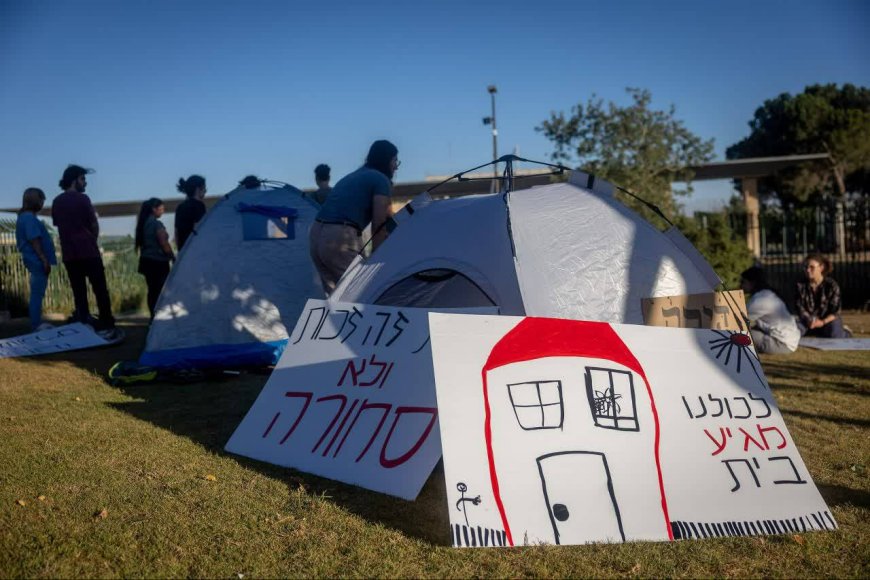As Israel’s housing crisis deepens, Netanyahu and his extremist allies continue to ignore the situation
As Israel’s housing crisis deepens, Netanyahu and his extremist allies continue to ignore the situation

Israeli society is grappling with the severe challenge of the cost of living, particularly the skyrocketing housing prices, which, according to survey results, are considered to be the most significant issue for the Zionist government to address. It is evident that this particular issue is not exclusive to the current cabinet under Prime Minister Netanyahu.
Over the course of four years, during five consecutive elections held in the occupied territories, the main concern for the majority of Israelis has been the pressing need to alleviate the astronomical costs of living, with housing expenses taking the lead in this regard. However, the ongoing crisis of escalating housing prices in Israel is a deeply ingrained structural problem. This is due to the fact that the administrations of both left and right political parties in recent decades have demonstrated a lack of viable solutions to address this lingering problem. In the same vein, Netanyahu lacks a strategy for tackling this crisis.
The housing crisis in the occupied territories is a matter of grave concern. According to a recent announcement by Israel's Central Bureau of Statistics, the average price of apartments in Israel has surged by 11.3% over the course of the past year. This new data sheds light on the growing challenge of financing the purchase of a home in Israel, a pattern that is likely to have far-reaching sociopolitical implications. Accordingly, in order to afford a moderately priced apartment in Be'er Sheva, one must have saved ten years' worth of salary. It takes 10 years in Haifa, 13 years in Ashkelon, 27 years in Bayt al-Muqaddas [Jerusalem], 25 years in Bnei Brak, 22.2 years in Tel Aviv, and 20 years in Netanya to buy an apartment. In a separate report, the CBS had projected a 23% drop in new apartment projects through the end of 2022.
The report has indicated that the precarious security situation in the occupied territories has prompted a mass exodus of housing construction companies, leading to an unprecedentedly low supply-to-demand ratio. The housing crisis has been further exacerbated by a dearth of land and basic materials for construction, limited access to skilled labour, and protracted procedures for obtaining building permits. In this regard, experts have predicted that Israel will face a housing crisis in 2023, and the increase in population over the next decade could exacerbate this crisis.
According to the "Ynet" news website, in more than 90% of Israeli cities, the birth rate exceeds the rate of housing construction, with the disparity being particularly noticeable in Haredim Jewish communities and Arab cities. In Jerusalem, only one apartment is built for every 6.5 births.
Another salient aspect to consider is that the present state of affairs in Israel suggests that the housing crisis will likely deteriorate further in the next decade, as the Israeli Ministry of Energy announced in April 2023 that there would be a shortage of raw materials for housing construction. This shortage is expected to persist until 2040. The report suggests that there is a persistent upward trend in housing prices, which is expected to continue both in the present year and beyond.
In Israel, there has been a surge in interest rates, leading to a heightened interest among potential apartment buyers to find the best options for securing a home. In light of the current housing crisis, the question arises as to whether the lottery system for newly constructed apartments can serve as a final solution.
According to three prominent Israeli real estate officials who spoke to Yedioth Ahronoth, there is no miraculous remedy for the real estate market. According to them, the housing crisis in Tel Aviv is a national one, just as the COVID-19 pandemic was a national one. Consequently, it is imperative that a qualified authority with exceptional capabilities assume the responsibility of addressing the housing crisis who solely reports to the Prime Minister and possesses the power to issue comprehensive directives to all pertinent government agencies.
Yaakov Litzman, the head of the United Torah Judaism Party, which is considered an ultra-Orthodox Haredi party, serves as Netanyahu's housing minister. He was set to be the first Haredi member of the security cabinet, but owing to massive demonstrations, he gave up and resigned. Given the government's fanatical drive to develop settlements in the occupied Palestinian territories, the appointment of Litzman to the Construction and Housing Ministry is indeed intriguing.
In his first days in office, Yitzchak Goldknopf, the new Israeli Minister of Housing, stated to the media, "I don't know if Israel is really facing a housing crisis or not." Yet, it is common knowledge that real estate prices in occupied Palestine have increased by 20% this year and that only a small number of Israelis can afford to buy an apartment. Contrary to his pledges to aid the poor Orthodox community, Goldknopf is an extremist Zionist businessman, a rich real estate dealer, and the owner of multiple flats in a luxury tower in Tel Aviv.
As a result, Goldknopf's ignorance of Israel's housing predicament may look totally normal.
However, this issue demonstrates that the hard-line members of Netanyahu's cabinet, who have recently taken charge in Tel Aviv, are either unaware of the gravity of the situation in their jurisdiction or are making efforts to convince the public that the housing crisis is nonexistent.













































